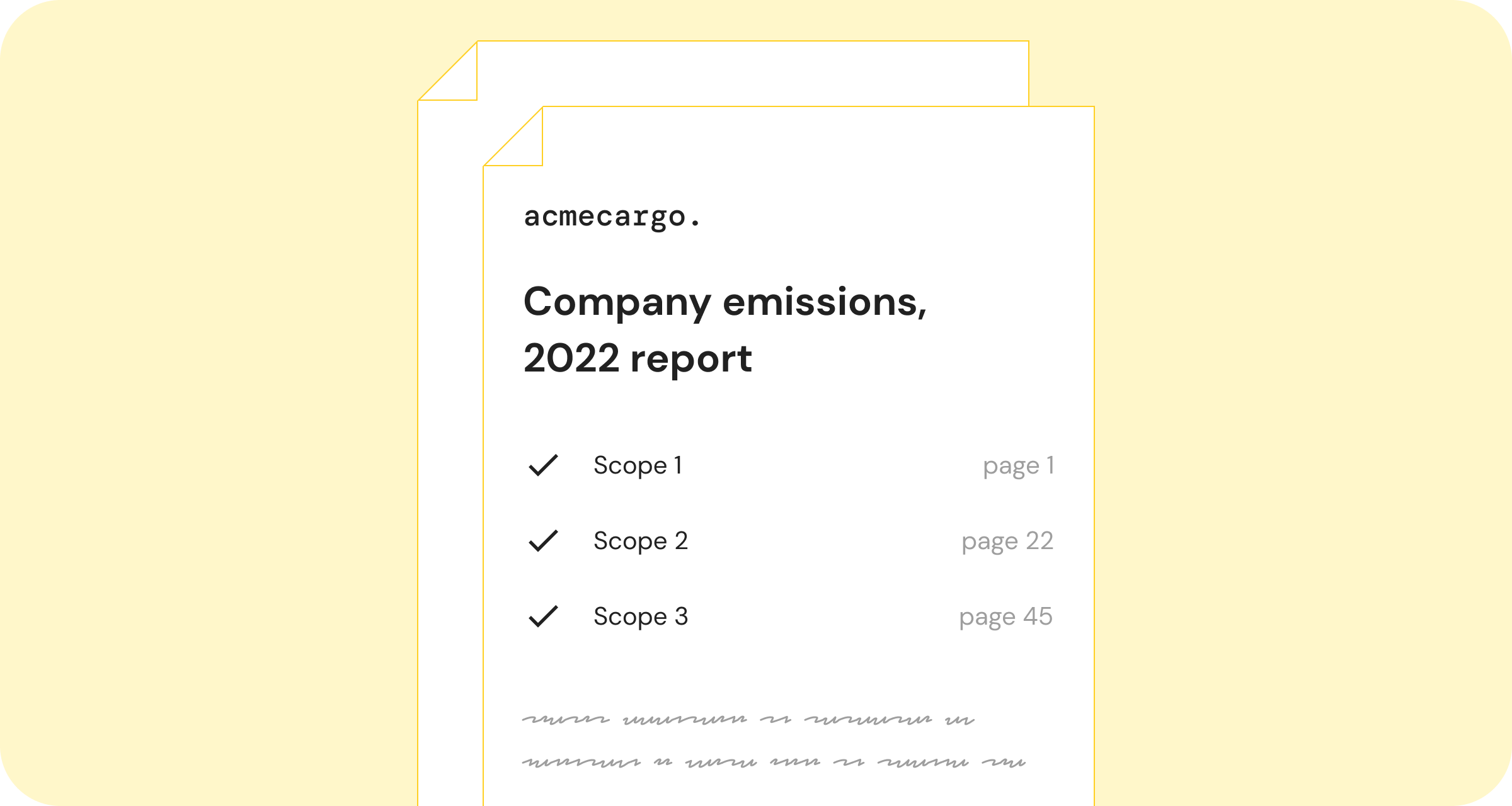

We think that every company should be making sustainability a business priority in their roadmap. And not just because it's the right thing to do, but also because it makes good commercial sense. Not convinced? Read on to find out why.
In the not-so distant future every company is going to be a climate company.
There will be more and more pressure to prove that we’re addressing our environmental impact in business; we’re even starting to see corporate liability for emissions being legally enforced.
Even in the present, consumers are actively searching for greener, climate-friendly alternatives when making purchasing decisions. Business sustainability is now considered a foundational component in assessing IPO readiness. Investors and financial firms are looking for positive climate impact when evaluating the health and future viability of their portfolios. And the most talented amongst us are looking for jobs at companies with purpose at the core of their operation.
Acting now on business sustainability offers competitive advantage: a way to stand out from the crowd as a force for good, for both customers and employees.
So why is there still a lack of urgency from businesses when it comes to acting on the climate crisis? Why isn’t every company making sustainability a business priority in their roadmap?
The common barriers for business sustainability
Over the past year we’ve spoken to dozens of companies about their sustainability plans.
We’ve found that most of them understand they need to play their part in climate action and are open to, and excited about, working on their own business sustainability.
But when it comes down to the nitty gritty of actually getting started on that climate positive journey, there’s one key recurring theme that comes up as a barrier: how sustainability aligns with existing commercial strategy and goals for the business.
For any new project, scheme, or campaign to fly at an organisation it has to make good commercial sense. For many companies, it’s hard to see sustainability as a business opportunity. Instead, it is always seen as a cost centre.
The most common worries we hear about making climate impact a priority are :
- Cost. Whether it’s hiring a Sustainability Lead, paying for energy efficient building upgrades, or purchasing carbon offset credits, there are costs attached to becoming a climate positive organisation.
- Time. It takes time and effort to do corporate sustainability right and it’s still uncommon for companies (especially smaller businesses) to have a dedicated sustainability team, so it will take time and manpower away from other areas of work that are perhaps more explicitly aligned with driving growth and profits.
- Competing business priorities. Corporate goals and plans will already have been set, meaning other revenue generating priorities are at play. We’ve experienced this first-hand when a company de-prioritises climate initiatives, telling us “we definitely want to work on sustainability, but it just doesn’t fit into our roadmap right now – come back to us in a few months time.”
- The unknown. Sustainability in business is still fairly new and it’s hard to quantify exactly what the commercial results will be for the business, and therefore difficult to persuade management that climate should be an area of focus.
- Reputation. Climate change is a delicate topic and it’s important to communicate sustainability work in the right way. Many companies fear accidentally communicating in the wrong way and being perceived as greenwashing – especially if there are no internal ‘experts’ to lean on.
All of these are valid concerns. It almost definitely will result in business expenditure if you want to have real positive climate impact. And it should cost to emit greenhouse gases, given the damage they’re doing.
But at the same time, it also does make commercial sense to make sustainability a priority.
61% of retailers are seeing increased demand for sustainable products, and these sustainable products are seeing 5.6 times faster growth (HBR). This trend seems highly likely to continue, with 62% of young consumers preferring to shop products that are green and sustainable (Shopify).
With this in mind, the upfront costs will be minimal compared to the long-term loyalty gained.
We’ve seen this manifesting ourselves too when exploring the payments industry.
We surveyed 500 customers and found that 71% want a ‘green payments method’, and that 77% of customers would remain loyal to a brand that automatically offset the carbon emissions of their purchases.
Everywhere you turn today you’ll see brands that are successfully differentiating themselves through making climate action part of their business mission.
Take Patagonia for instance, which has grown from a small-scale clothing producer for rock climbers to an iconic outdoor clothing retailer, widely recognised for the environmental good it does as a brand.
Climate impact lies at the core of every business decision made at Patagonia. From minimising the emissions in their own supply chain, to donating 1% of profits to environmental non-profits, to encouraging second-hand shopping through their Worn Wear initiative to the Black Friday ‘Don’t buy this jacket’ marketing campaign.

Through prioritising environment they’ve also fostered deep loyalty and trust from their environmentally-concerned customers, who choose to support Patagonia again and again because of the aligned values that they embody: to ‘cause no unnecessary harm’ and ‘use business to inspire and implement solutions to the environmental crisis’.
So it's clear that addressing sustainability and growing your business are not mutually exclusive goals. But are there other contributing factors alongside these commercial ‘barriers’?
We think the bystander effect might have a lot to do with it.
The role of the bystander effect
The bystander effect is a theory in social psychology that we are less likely to help in an emergency situation when there are other bystanders present.
Research suggests there are three key reasons:
- Diffusion of responsibility: we feel less responsible because there are other people who could also be responsible for taking action, and as the group of bystanders increases our own personal feeling of responsibility decreases.
- Evaluation apprehension: we fear being publicly judged for our actions.
- Pluralistic ignorance: we use the reactions of others to determine how we do or don’t react to a situation ourselves, following the group response even if we privately think differently.
We’ve touched on the fear of being judged as greenwashing before, which fits with the idea of evaluation apprehension. But we think there’s something in the other reasons that also rings true for businesses.
When it comes to responding to the climate emergency, there are a hell of a lot of bystanders.
Individuals, governments, charities, other businesses. It’s a crowded environment. And the ‘diffusion of responsibility’ suggests that this means we’re less likely to respond.
Plus, if we aren’t seeing those other bystanders responding themselves, by ‘pluralistic ignorance’ we’re likely to think it isn’t critical that we act now either – especially given that climate change is already a problem that seems far away and is hard to wrap our heads around solving.
So it makes sense that businesses aren’t acting faster on climate change.
But the climate crisis is also very real, and communities across the world are already feeling its impacts. We will all have to make changes to become climate positive, and that includes businesses.
As more and more businesses do make changes, there will inevitably be a tipping point where it becomes the norm for companies to be serious in their climate commitments, when every company is expected (or even mandated) to be a climate company. Those businesses who choose to prioritise climate now will be seen as climate champions, and those lagging behind may find themselves shunned.
Don’t let yourself, and your company, become just another bystander in the most pressing emergency of our time. Start prioritising your climate journey now and be the ones taking initiative and leading the charge, ahead of the curve. In doing so you’ll differentiate yourself from your competitors, grow your business, gain loyal customers, and attract the best new employees to join your team.
Here’s a few ideas on how to get started with that prioritisation exercise:
- Customer sentiment. You’re probably already tracking customer perceptions of your brand, so why not start talking to your customers about their views on your (potential) green proposition too. Understanding how important sustainability is to your customers will help to emphasise that positive climate impact is a revenue driver, and so make it easier to prioritise making it a part of your customer experience.
- Competitor offerings. Ask your customers what they think about the eco-credentials of your competitors too – it might be the incentive your company needs to act faster on climate. Equally, if there doesn’t seem to be a green offering out there in your category, this will provide even stronger evidence that there’s an opportunity for your company to differentiate through sustainability, and drive customer loyalty.
- Company stakeholders. Even business leaders have others they answer to: investors, shareholders, board members. Helping senior decision makers in your company understand that these stakeholders are expecting to see action on climate impact now, can help them to reposition sustainability as having equal (or more) importance than the commercial targets they typically answer to.
Oh, and about that fear of going about it the wrong way and getting accused of greenwashing?
That fear can be massively reduced by working with a sustainability partner you trust, helping you to choose the right solutions and the right messaging. Which, by the way, is exactly what we do at Lune – so get in touch we'd love to chat further,
Readers also liked
Readers also liked

Subscribe for emissions intelligence insights
Get the latest updates in the world of carbon tracking, accounting, reporting, and offsetting direct to your inbox.


